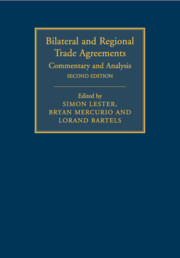Book contents
- Frontmatter
- Contents
- List of contributors
- Foreword
- Table of Cases
- Table of treaties and international agreements
- List of abbreviations
- Part I Introduction
- Part II Economics and politics of PTAs
- Part III Relationship with WTO and international law
- Part IV Legal aspects of PTAs: A comparative analysis
- Index
Foreword
Published online by Cambridge University Press: 05 October 2015
- Frontmatter
- Contents
- List of contributors
- Foreword
- Table of Cases
- Table of treaties and international agreements
- List of abbreviations
- Part I Introduction
- Part II Economics and politics of PTAs
- Part III Relationship with WTO and international law
- Part IV Legal aspects of PTAs: A comparative analysis
- Index
Summary
A sign of the times in trade is that the scholarship of some of the best thinkers on trade law is focused on new bilateral and regional trade agreements instead of on new multilateral trade agreements. This is not because they no longer care about multilateral agreements. It is because there are no new multilateral agreements. Since the conclusion of the Uruguay Round and the establishment of the World Trade Organization two decades ago, the Members of the WTO have, alas, failed repeatedly in their efforts to reach a consensus and conclude new global trade agreements.
Frustrated with years of endless impasse in the WTO Doha Development Round of multilateral trade negotiations, trading countries have turned increasingly to negotiating bilateral and regional deals, largely outside the legal framework of the WTO. During the past decade, these bilateral and regional deals have proliferated. Where once there were only a few, now there are a few hundred. Recently, these smaller bilateral and regional trade and investment deals have led to negotiations by major trading countries outside the WTO on so-called ‘mega-deals’ that, if concluded, would be beyond the shelter of the legal umbrella of the WTO.
These proposed mega-deals have drawn widespread support from those who see them as the only practical way forward from deadlocked multilateral WTO negotiations. The mega-deals could add much-needed new rules on many new issues in world trade. They could address a twenty-first century trade agenda ranging far beyond the traditional concerns of customs and tariffs. However, they could also exclude the vast majority of WTO Members, including most emerging and developing countries, from the benefits of these new arrangements. Stopping such discrimination in trade is much of what the WTO trading system is supposed to be about.
Simon Lester, Bryan Mercurio and Lorand Bartels are three of our leading thinkers on trade law. In editing this collection, they have come together to try to make some sense of the significance of this trend toward partial rather than global trade arrangements.
- Type
- Chapter
- Information
- Bilateral and Regional Trade AgreementsCommentary and Analysis, pp. xiii - xvPublisher: Cambridge University PressPrint publication year: 2016



